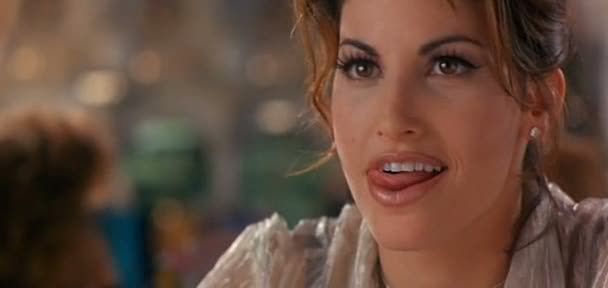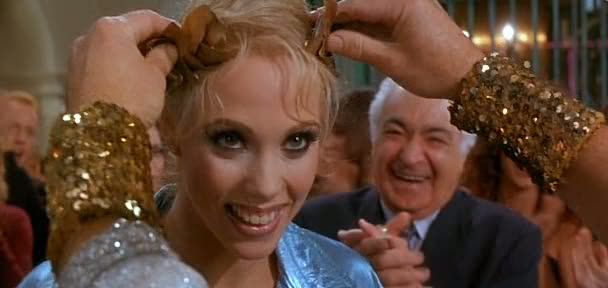
Paul Verhoeven's Showgirls must surely be among the most absurd movies ever made, a gaudy, nasty, hysterical tribute to excess and bad taste. Made from a script by the notoriously exploitative Joe Eszterhas, Verhoeven's collaborator on Basic Instinct and a seasoned peddler of sleaze, the film is a glorious mess, a neon overload of sexploitation. It's the inspirational story of an ambitious young girl who fights and claws her way to the top of her profession, struggling to be the best she can be, fighting to make her way on sheer talent and drive alone. Uh, yeah. That's what it's supposed to be, anyway. That's the kind of movie that Showgirls models itself on, the movie where the small-town girl makes it in the big city because she's just so talented, so tough, so pretty — she gets the gig, gets the guy, wins the hearts of all America in the process. These kinds of films are capitalist fantasies, melodramatically romantic visualizations of the idea that anyone in America can pull herself up by the metaphorical boot straps. There's a reason these kinds of films are so popular, why they're an enduring mainstay of the American cinema, virtually a genre unto themselves: everyone likes to feel like this success is possible, that anyone can make it with enough hard work and dedication. Everyone likes to think America is a meritocracy where those with talent rise to the top.
Showgirls is, defiantly, outrageously, not this type of movie, though it pretends to be right down to the very end. It is a remarkably straight-faced parody of the genre it supposedly represents, probably because its lead actress, Elizabeth Berkley, seems to think that's the kind of movie she's in. Berkley pours herself into her character, the aspiring dancer Nomi Malone. She stomps around, she pouts and cries and squeals (actually squeals!) with delight, she eats junk food with the ferocity of a true carnivore. She dances so vigorously she looks like she's in the midst of a particularly tough fight, flailing her arms around as though throwing punches. She pumps her hips and flashes her body for anyone who'll look. She intones Eszterhas' frankly ridiculous dialogue with earnest intensity. She completely sells every moment, and it's obvious: Nomi thinks that her arc in this film is one of self-discovery and self-realization, because that's exactly what Berkley thinks. By the end of the film, as she's unleashing vicious roundhouse kicks (Nomi, kung fu master!) at the head of a brutal rapist, or dramatically heading out of town in her six-inch stripper heels, she seems triumphant, redeemed, a new woman born from the shell of the old, a beautiful butterfly emerging from her cocoon. Or some crap like that, anyway.
In her own way, Berkley delivers an astonishing performance, though certainly not a "good" one. Then again, what would be a good performance in this context? The character of Nomi demands a certain badness, a wide-eyed enthusiasm and intensity. She's larger than life, and Berkley is the perfect actress to play Nomi because she's just so raw and sloppy, so awkward, so completely without barriers. She never seems to catch on to the fact that she's in a farce, which is probably a good thing, because that would kind of ruin the fun. And oh what fun there is. The film is delirious and pretty much batshit crazy, a neon-tinted orgy of American enterprise run amok. It's a delicious satire, because on its surface it doesn't seem satirical at all. It's a fairly accurate portrayal, one suspects, of exactly what goes on in this kind of milieu: the bitchiness, the catfighting, the trading of sexual favors, the ugly, seedy underside to all the glitz and glamour. Nomi arrives in Las Vegas, running away from her past, hoping to become a dancer. She starts working in a strip club, not exactly her dream, but this film would be a tragedy if Nomi wanted to be a ballerina and wound up just shaking her tits and ass instead. No, it's a comedy because the peak of her ambition, the one thing she absolutely wants to do, the dream job that would drag her out of this hellish strip club, is to be a showgirl in a flashy topless revue at one of the Vegas nightclubs. Yes, she's a stripper who dreams big: she wants to show off her tits and ass in a "classy" setting. (The quotation marks are necessary because this is Vegas' idea of "class," class as conspicuous consumption; the brighter everything shines, the classier it is.)
There's a hilarious scene when Nomi first sees the revue, which is called simply "Goddess." It's a faux-arty melange of leaping half-naked dancers, explosions and lots and lots of glitter, and at its center is the sexy, bitchy superstar Cristal Connors (Gina Gershon). The show looks like the Cirque du Soleil with bare boobs, gloriously tacky and gaudy. And Nomi is transfixed, raptly watching from the crowd as though confronted with a heavenly vision, her hands unconsciously mimicking the poses of the dancers on stage. Her eyes shine: she knows what she wants. Clearly, Verhoeven is having fun here, offering up all these kitschy surfaces without comment, as though to say, here it is, here's the American dream in all its glory, this is the pinnacle, this is something to aspire to. It's virtually the same attitude as the director took in his equally opaque satire Starship Troopers; both films offer up exactly what Verhoeven assumes that audiences want. It's a gesture of contempt, in a way, giving them what they want in the crudest, most overblown fashion. You asked for it, you got it. Want lots of mindless violence, things blowing up, blood and gore and video game special effects? Here's Starship Troopers. Want sex and glitz and conspicuous consumption, want excess and naked bodies? Here's Showgirls. One suspects that these two films together represent what Verhoeven sees when he looks at the American film industry, and it's apparent that he doesn't like what he sees.

This perspective gives the film a wicked edge, a biting undercurrent that elevates it to the level of a camp classic, albeit a deliberately campy one. It's all in the details, like the richly funny performance of Gina Gershon, who plays the whole film with a predatory, crooked smile, permanently baring her teeth as though ready to bite into her prey. If Berkley probably isn't in on the joke, Gershon definitely is, and she feeds into the campiness of the project, relishing the overblown dialogue, rolling her tongue around her lips, looking at Berkley's Nomi with naked lust in her eyes, pouting her lips out until they look like shelves. She's lively and funny and bitchily endearing. Berkley, on the other hand, plays every scene with a deer-in-the-headlights stare; her Nomi is half lost little girl and half vicious tough dame, with a switchblade and a temper.
This is fitting, of course, because one of the film's unspoken (but nonetheless central) jokes is that Nomi just isn't that talented: she looks at home in a strip club, and even seems to be a talented stripper, as far as that goes, but once she's elevated to the moderately more demanding burlesque show, with its complex routines and choreography, she seems out of her element, awkward and ungainly. She goes far because she generates "heat," which seems to be code for everyone wanting to fuck her, both the men and the women. And indeed, one of the film's recurring lines is that she dances like she fucks, which is especially funny in light of an early scene at a club where she's spastically dancing, flailing her limbs around, obviously thinking she's cool and sexy when in fact she looks like a malfunctioning machine; one expects to see sparks flying from her joints. Sure enough, later on, when she gets a comically overwrought sex scene with entertainment manager Zack Carey (Kyle MacLachlan) in Zack's pool, she fucks him by straddling him and then flailing wildly, flopping around in the water like a fish that's just been hooked. At the moment they orgasm, she throws her head back into the spray of foamy water pouring from a dolphin statue's mouth, another of Verhoeven's typically unsubtle jokes. The film is all about details like this. See also: the way, immediately before this jaw-droppingly unsexy sex scene, Zack switches on the green neon palm trees by his poolside, doing it with a suave flick of his hand, as though it's meant to seduce her. The even funnier second punchline is that it does seduce her; of course Nomi gets off on neon.
The film is bathed in neon, too, simply saturated in it. It must be one of the most garish, brightly colored films ever made, and its visual sensibility matches its over-the-top acting and soapish storyline. It's a brilliant, deadpan satire, hilarious and tacky and relentlessly overblown, nearly operatic in its frenzied excess. It's a film about the American dream, but not quite in the way it pretends to be: it's about people who scratch, claw, betray and sleep their way to the top, about crass commercialism and the marketing of sexuality (this last of course a great irony since the film itself was marketed on the strength of its sexual excesses). It's a film in love with its own melodrama, in love with the neon overload of Las Vegas even as it satirizes and mocks it.







0Awesome Comments!